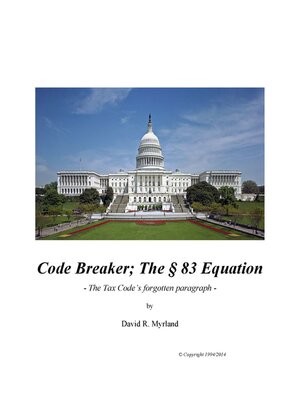
Sign up to save your library
With an OverDrive account, you can save your favorite libraries for at-a-glance information about availability. Find out more about OverDrive accounts.
Find this title in Libby, the library reading app by OverDrive.



Search for a digital library with this title
Title found at these libraries:
| Library Name | Distance |
|---|---|
| Loading... |
This manual focuses on Tax Code § 83 which remains unknown to the accounting industry, the legal profession, and IRS personnel. HOWEVER, the courts say that § 83 is universally applicable and fundamentally governing:
US Tax Court: "The amount taxable as ordinary income was the lesser of the fair market value of the stock ... over the individual's cost of the stock. ...the language of the section [Tax Code § 83] covers the transfer of any property transferred in connection with the performance of services... The legislative history makes clear that Congress was aware that the Statute's coverage extended beyond restricted stock plans for employees." (See Cohn v. Comm'r of IRS, 73 USTC 443, 446 (1979)).
Fifth Circuit: "Section 83(a) explains how property received in exchange for services is taxed." (See Montelepre Systemed, Inc. v. Comm'r of IRS, 956 F.2d 496, 498 (CA5 1992)).
Second Circuit: "At the heart of this case is I.R.C. § 83 [Tax Code § 83], which governs the taxation of property transferred in connection with the performance of services." (See Gudmundsson v. US, 634 F.3d 212 (CA2 2011)).
This manual is the first and last word on the meaning and operation of the statute that determines whether Americans owe an income tax on their hard earned pay. When you observe how this interpretation comes together you'll quickly come to understand why the IRS refuses to indulge any and all inquiries as to how Tax Code § 83 operated in any determination of income tax liability.







